- Home
- Geoff Wolak
Wilco- Lone Wolf 12 Page 5
Wilco- Lone Wolf 12 Read online
Page 5
I saluted as the roar from the Hercules eased, now in just a shirt with the sleeves rolled up, but I had borrowed an SAS beret.
‘Captain Wilco I presume.’ He returned the salute, and I noticed his boots halfway up his shins. ‘Come, we’ll get you some chow and a shower, I know what these flights are like.’
‘Thank you, sir.’ I glanced at his uniform. ‘What’s your parent unit?’
‘Rangers, but we have a mixed bag here, some Green Beret and some Airborne, all instructors.’
‘Will the Green Berets continue to have a role in the future?’ I asked as we reached the jeeps.
‘Good fucking question, wish someone would tell me.’
I took out my sat phone and looked for missed calls just as we mounted up, my bags carried, the lads in other jeeps. It trilled. ‘Da!’
‘It’s me,’ Tomsk began.
‘You using that treadmill?’ I asked in Russian, the Lt Col glancing over his shoulder, a disapproving look given.
‘Yes, yes. Listen, I got some information about some fucks with Sarin Gas.’
‘Sarin!’
‘Yes, it’s come from Asia, but it’s not Sarin, they made it to look like it and smell like it, but it’s not deadly like Sarin. Ship left Northern Cyprus today, don’t know any more than that, and I can’t push it.’
‘OK, I’ll deal with it.’ Call ended, I put a firm hand on the driver’s shoulder. ‘Pull over. Now.’
He glanced at the Lt Col and eased up. I eased out and took a few steps, the convoy behind halting, and I called London as I stood in the sand.
‘Duty Officer.’
‘It’s Wilco, get a message to all interested parties and send it up the line: ship left Northern Cyprus today with Sarin Gas -’
‘Sarin!’
‘It’s not real Sarin, it’s made to fool us into thinking it is. Send it up the line fast, before the French impose Martial Law over a stink bomb.’
Next call was the Deputy Chief as the Lt Col came around the jeep, looking a bit put out, quite a bit put out. ‘It’s Captain Wilco, get me the Deputy Chief.’
‘He’s in a meeting -’
‘Interrupt him, right now!’
‘Hold on,’ came an unhappy voice.
I waited, the Lt Col stood with hands on hips and looking like he wanted to chew me out.
‘Wilco?’
‘Yes. Listen, ship left Northern Cyprus today with look-a-like Sarin Gas.’
‘Look-a-like gas?’
‘Enough to cause a panic, enough to fool us into starting a panic, but not deadly. I’m in Nevada with the new Lone Wolf programme, look into it will you?’
‘I’ll have a team on it in minutes.’
He ended the call, but I held the phone to my ear as I stepped to the Lt Col. ‘Yes, General, just arrived in Nevada, hot and sunny. How’s Washington? Listen, the Lieutenant Colonel here, OK if I shoot him in the leg?’ I paused as the Lt Col stood wide-eyed. ‘You’re no fun, sir, and if I shot him I’d say sorry afterwards. OK. Bye, sir.’ I put the phone away. ‘Shall we continue, sir?’
‘I was warned not to screw with you, warned you had friends in high places, but since you’re a captain, and a foreigner, I foolishly thought I was in charge here.’
‘And I’m happy for you to continue to believe that, sir,’ I said as I mounted up.
He walked around and jumped in, and we pulled off. ‘You speak Russian.’
‘I speak several languages, sir, and to clarify my position – I work for Intel, yours and ours, I don’t take orders from the British Army – but me and my men look like we’re Army, special forces, and technically we are, just that in the UK the politicians don’t let Intel have their own armed teams.’
‘Similar here I guess, special forces teams loaned to the CIA, but the Army generally runs those teams using CIA intel. CIA don’t have their own para-military units, and they got their arses kicked by Congress after the Cuban screw-up, so I know it’s a fine line. Personally, I’d avoid the CIA if I could.’
The base had an officers mess, so I enquired about my team. They would be in a hut, so I insisted I would be in the hut with them, Samantha and her colleague to be in the officer’s mess, the Lt Col again put out.
‘And, sir, I’m ready to start right now, or anytime you are, and time is at a premium, those above us want fast results.’
He glanced at his watch. ‘Drop your kit, I’ll have the driver take you to meet the instructors and shrinks, whole fricking team of oddballs here.’
‘I won’t be long, sir. Oh, and our crates, sir, weapons and ammo?’
‘At the base armoury, ready when you need them.’
I walked back to the jeep with the lads in, and squeezed in, soon at a hut, many soldiers milling around, and this hut was one of perhaps sixty. It had a number, so we had to remember the number.
I had a quick look inside, and a hut was a hut, but these were nicely maintained and well equipped. Bag down, I told the lads to rest but that I would find out about “chow”. I told the driver to take me to the HQ Building, thinking I needed sunglasses; it was very bright.
At the HQ brick building I asked for the Lt Col, and was directed to a seat, cold drinks offered or coffee, a fifteen minute wait till the Lt Col appeared with a major. I followed them to a waiting jeep, a short ride to a larger building, a lecture hall of sorts but just three steps up, three raised areas, twenty NCOs sat, a few officers, about twenty civilians.
They stood for the Lt Col, at least the military men did. He indignantly pointed me to the front of the room, turned and told the men to sit, but three were lady officers of some sort.
I threw down my beret on the front desk, a hand run over my hair. ‘My name is Captain Wilco, and as I explained to the Lieutenant Colonel here earlier I work for Intel, our and yours, I don’t work directly for the Army.’
Many of the instructions looked less than impressed with me so far. Arms were folded.
‘Technically I’m a captain, salary and uniform, but my jobs come from Intel. Hostage rescue starts with information from Intel, attacks against al-Qa’eda training bases start with information from Intel, and in the UK the original Lone Wolf programme was designed – simply – to find another man like me.
‘I was a natural runner, a high IQ, and I wake every morning at 5am feeling wide awake and go for a run. But I also spent time in prison, and I had issues with those around me, and I was nudged towards jobs for Intel – who placed me with the SAS for training.
‘So I’m an SAS army captain because of Intel, and our original Lone Wolf programme was to find and train men for solitary missions that fell within the remit of Intel more than the Army.
‘Having said that, our Lone Wolves have taken part in several small wars and have worked as they would in their wartime role. That wartime role would be long range insertion behind the lines, something to look at or to blow up. In peacetime the Wolves are involved with recon missions for Intel, sometimes with a purpose to shoot in anger. They do not work like spies on the streets of Europe.
‘We’ve had some success with them, Intel are happy, and your government now wishes to experiment with your own programme, to produce your own Lone Wolves. But let me make something clear, something that the British SAS have always maintained: a man that works well alone ... works well in a team.
‘The Lone Wolves were selected for the fact that they were unmarried, loners, oddballs in their parent units yet fit and skilled. Despite that initial profile, the Wolves have always worked extremely well in small teams and alongside my men. There’s nothing stopping good individual operators coming together and working well, so if the standard for a dangerous mission is a four man team they can do that, and have done that well.
‘Now, my first training programme for the Wolves was that of a special forces nature, and I trained men that were lagging so that we had no drop-outs. One man was killed in a parachute accident, one broke an ankle, none were kicked out.
‘But I was not happy with the trai
ning programme, and in Morocco I devised a system called “ever expanding circles” to train my men and French Echo, as well as the Wolves. Recently, two weeks ago, we started on a fresh batch of British recruits, and after a few days on weapons they were started on my ever expanding circles.
‘In the morning they run before breakfast, and fitness is important yes. They then undertake a standard shooting contest several times during the day, but between each contest they either walk or run with heavy backpacks, the physical activity getting harder and harder each day. They also have a pistol contest during the day, all scores added to a chart.
‘But as they shoot, rifle and pistol, my men coach them how to shoot better, so it’s training as well as testing.’
I patrolled the front area. ‘What I want ... is a man that can shoot straight and hold his nerve when the time comes, when he’s tired, cold, wet and hungry, maybe wounded. Any soldier can learn to read a map, cook a rabbit, drive a truck. What makes a difference is how a man reacts when he’s under pressure, in danger, hurting, wanting to run away and hide.
‘My three day test in the UK has a standard shooting contest, but the candidates are kept awake for three days, they run around the hills, they’re chased by dogs, and we have some very excellent simulated artillery – loud bangs in the dirt that scare the hell out of the candidates.
‘We put jelly and sand down the underwear of candidates, and they have to take a leak in their trousers, all designed to make them uncomfortable, all designed to try and distract them from hitting the targets. A man that can stay focused and shoot ... is a candidate for my team, as Captain Mahoney was. I now have with me another American officer who did well on my three-day test.
‘That three day test is similar to my ever expanding circles, and what the British candidates will undertake in between the shooting contests will progress to desert marches, long distance navigation, parachuting, driving. All of those tasks will fall between shooting contests, the aim being to see if the man is still focused on hitting the target after a parachute drop as he is first thing after breakfast, if he is still focused after he’s been out all night.’
I took out my graphs. ‘What we did recently was to make accurate graphs of their performance, and something unexpected revealed itself; the personalities of the men appeared on the graphs in front of our eyes.’ I picked out two and held them up. ‘Erratic man, consistent man.’ I handed them to the front row officers and grabbed two others and held them up. ‘Better in the morning, better at the end of the day.’ I handed them over and they were passed back.
‘What the graphs are showing us ... are traits that we might have got from an interview, but that interview could be flawed, the candidate might lie or give us an answer he thinks we want. The graphs don’t lie, they tell us his core personality before we see that man getting shot at for real.
‘Ladies and gentlemen, here we’ll reproduce that, assuming that you wish to replicate our successes and take my advice. What’s needed first is a standard shooting contest. We use four rounds stood at 100, four rounds knelt at 200 and 300, four rounds lying at 400 and 500, and they run from each firing point. And that’s it, but we must be accurate in the scoring system.
‘Instructors coach and encourage, and we’ll design the stages - the things that the candidates do when not shooting, working to the point where the candidate is shooting when very tired, and when unsettled, culminating in a parachute drop, a long speed march, and back on the range.
‘Those candidates that go forwards will then repeat that in Morocco and Sierra Leone, as my Wolves will do in a few weeks, the difference being that there’s a chance they’ll step on an old mine or get shot at, and they’ll have the heat and the jungle to distract them.
‘Those candidates that are selected then have specialist training, expensive specialist training, that training done at a time when you know that the man will not break under pressure – and that he can shoot straight when dog tired.
‘That varies greatly from traditional military thinking, where you have a man trained for five years before he volunteers for something more exciting. He’s then subject to some expensive training, and you hope that when the time comes he’ll perform well. My ever expanding circles technique is to figure out if that man will perform well under fire, then you spend money on his expensive training. Any questions?’
A sergeant raised a hand. ‘If candidates go out to Sierra Leone, will some be injured?’
‘Injured and killed. And if a man is blown to pieces by a mine we’ll be looking closely at the men around him, and they’ll be back at the shooting contest straight away. Alternative is that you spend five years training him, then send him to Sierra Leone and hope for the best, fingers crossed.’
They exchanged looks.
‘I made a point of taking my Lone Wolves to Morocco during an insurrection, and to Sierra Leone, and they fired shots in anger, they lived each day in danger, sleeping rough, and we observed and judged them. None cracked, none let us down, none quit. And if you put one of your best men up against them they’d hold their own.’
‘And you, sir?’
‘And me, sir, what?’
‘Are you as good as they say, sir?’ he cheekily asked.
I smiled dangerously at him. ‘Why don’t we make a large wager ... and see.’ I took in their faces. ‘If anyone wants to organise a little contest, you can see if my reputation is deserved or not.’
A man at the back said to the sergeant, ‘I’d advise against it. You’ll lose your money.’
The Lt Col stood. ‘I’d not bet against him; anyone who wakes fresh at 5am is a god damn freak to me.’ He faced me. ‘So what’s first?’
‘A standard shooting contest, sir, as described, then ever expanding stages in between, ever more arduous, day by day – but with an emphasis on coaching as we go.’
He pointed at a captain. ‘You start in the morning, split groups, standard test, then sit with Captain Wilco and work out the stages.’ He faced me. ‘How long before we’re able to drop a few men?’
‘Fourteen days, sir.’
‘Less than I would have figured, so I’d be happy to put in an interim report in two weeks, they want results – and fast.’ He led his senior staff out.
An American civilian closed in on me, graph in hand. ‘This is great, personalities in numbers, it will make our jobs much easier.’
‘I have a control group in my intake, twelve men that are consistent, and their average is climbing. If they keep climbing they’ll reach the standard of my lads.’
I spoke with several groups, a few of the NCOs looking like they doubted me, and doubted my abilities. Well, with all of my injuries these days I doubted my own abilities.
One asked, ‘What’s with the shrinks?’ Five of his colleagues stood near us.
‘The shrinks are there to help you avoid embarrassing newspaper stories, when one of your off-duty soldiers goes into the local town and rapes and kills a girl. We hope to avoid another Vietnam, where some of your men killed for fun.
‘I want a man to shoot when I say, because I order it. I most definitely don’t want him to pull the trigger because he’s angry, or because he likes it. If he shoots a man when I say then cooks lunch with a smile, great. If he hates the guy he shot then that’s a concern for me.
‘Our British special forces soldiers sometimes go home on leave and kill their wives in a mad rage, or they kill a neighbour who pissed them off. Some are wound-up too tight, and some want to kill – to kill anyone for no reason, just to kill.
‘I look for men who kill for me, when I say, how I say, and don’t get emotionally involved. An aggressive man is no good to me, because they find it hard to wind down. My lads shoot and kill, then sit and cook, and never disobey me. You’ll meet some tomorrow.’
Back at the hut I found them all asleep apart from Nicholson. ‘I’m on stag,’ he told me.
‘I don’t think there are too many assassins around here,’ I quipped.
I smiled. And nodded. After a shower I wandered to another hut, finding fresh-faced soldiers with “high and tight” haircuts.
‘Ten shun!’ a young man shouted and they all panicked into line.
‘At ease, carry on with what you were doing, and don’t do that again for me. I’m British special forces, and we’re more relaxed about rank.’
I walked down the hut as they continued to check kit and rifles, sitting next to a soldier in a green vest top, the man looking fit and muscled, yet young and nervous with it. ‘What do you hope to get from this?’
‘Was hoping to pass, sir.’
‘And then what?’
‘Well ... they said we’d see some action maybe, special forces, overseas, sir.’
‘Better than just exercises, eh?’
‘Yes, sir.’
‘What unit you from?’
‘1st Battalion, 25th Infantry Division, Fort Wainwright, Alaska, sir.’
‘Cold up there.’
‘Yes, sir, in winter.’
‘You a runner?’
‘Selection for this course was twenty miles in basic kit and rifle, sir, a set time, and I beat me the time well and good.’
‘And school?’
‘Did well in High School but my folks were poor, sir, and my brother was in, so I joined up, figured I might get a college sponsorship from a technical trade, but I haven’t yet.’
‘How long you been in?’
‘Four years, sir, minimum for this course.’
‘Taking your time making your mind up about that sponsorship...’
He looked uneasy. ‘Yes, sir.’
‘Took me five years of shit before I joined special forces, got a commission later. And I spent time in military prison.’
He brightened. ‘You came up through the ranks, sir.’
I nodded as I stood. ‘Set you M16 rear sight to dead centre, 200yards, and forget the wind ... because you shoot men behind you as often as in front, sometimes all around in a hurry.’
A tall lad held up a paperback. ‘This you, sir?’
‘It is.’
‘Might I ask, sir ... if it’s true?’ he risked.

 K2 book 1
K2 book 1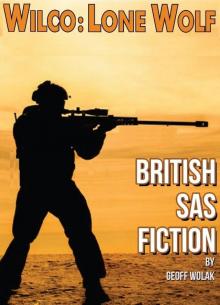 Wilco- Lone Wolf 22
Wilco- Lone Wolf 22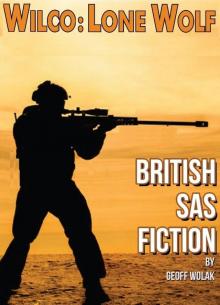 Wilco- Lone Wolf 20
Wilco- Lone Wolf 20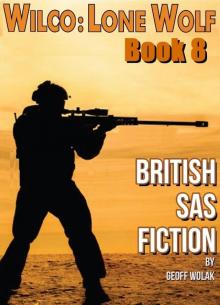 Wilco- Lone Wolf 8
Wilco- Lone Wolf 8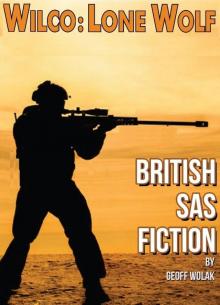 Wilco- Lone Wolf 17
Wilco- Lone Wolf 17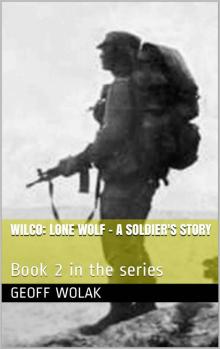 Wilco- Lone Wolf 2
Wilco- Lone Wolf 2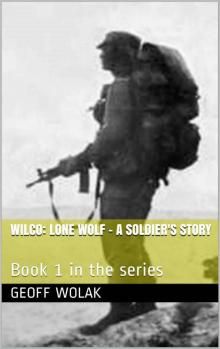 Wilco- Lone Wolf 1
Wilco- Lone Wolf 1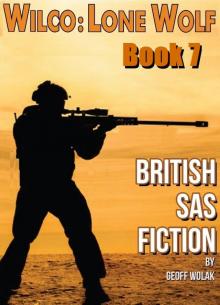 Wilco- Lone Wolf 7
Wilco- Lone Wolf 7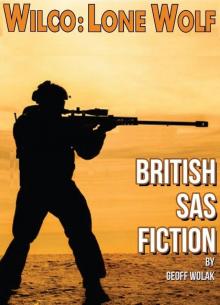 Wilco- Lone Wolf 15
Wilco- Lone Wolf 15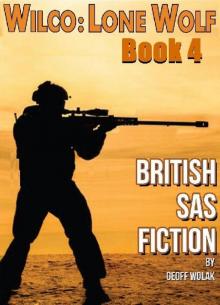 Wilco- Lone Wolf - Book 4
Wilco- Lone Wolf - Book 4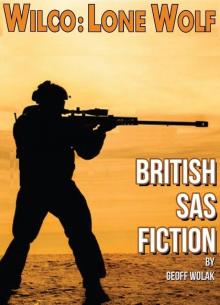 Wilco- Lone Wolf 21
Wilco- Lone Wolf 21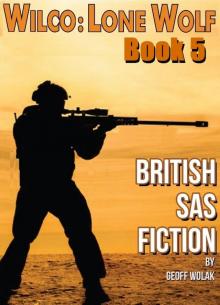 Wilco- Lone Wolf 5
Wilco- Lone Wolf 5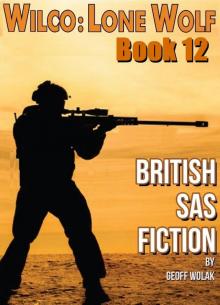 Wilco- Lone Wolf 12
Wilco- Lone Wolf 12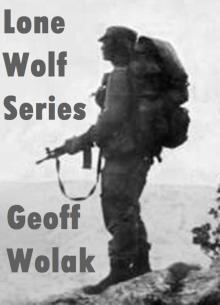 Wilco- Lone Wolf 10
Wilco- Lone Wolf 10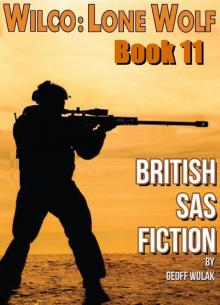 Wilco- Lone Wolf 11
Wilco- Lone Wolf 11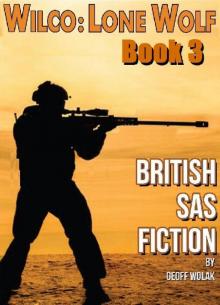 Wilco- Lone Wolf - Book 3
Wilco- Lone Wolf - Book 3 Magestic 3
Magestic 3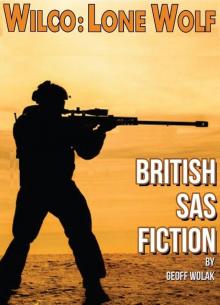 Wilco- Lone Wolf 19
Wilco- Lone Wolf 19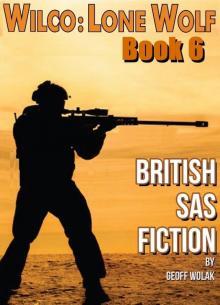 Wilco- Lone Wolf 6
Wilco- Lone Wolf 6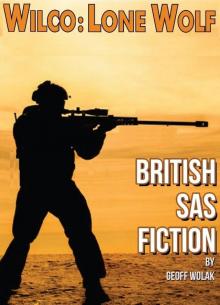 Wilco- Lone Wolf 16
Wilco- Lone Wolf 16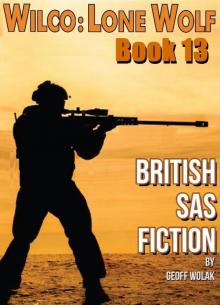 Wilco- Lone Wolf 13
Wilco- Lone Wolf 13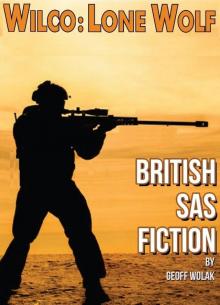 Wilco- Lone Wolf 18
Wilco- Lone Wolf 18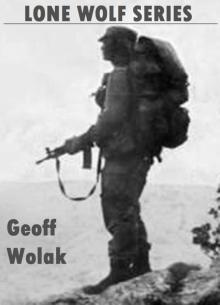 Wilco- Lone Wolf 9
Wilco- Lone Wolf 9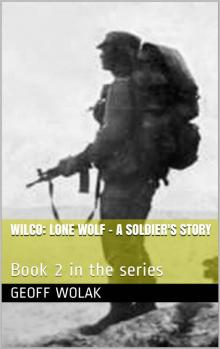 Wilco: Lone Wolf - Book 2: Book 2 in the series (Book 2 of 10)
Wilco: Lone Wolf - Book 2: Book 2 in the series (Book 2 of 10)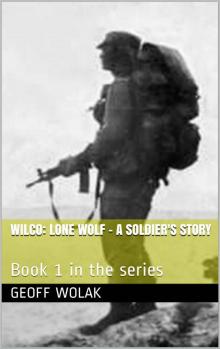 Wilco: Lone Wolf - book 1: Book 1 in the series (Part of an ongoing series)
Wilco: Lone Wolf - book 1: Book 1 in the series (Part of an ongoing series)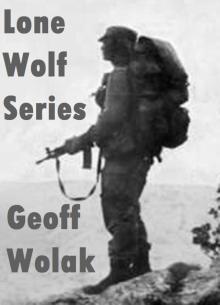 Wilco: Lone Wolf, Book 10: Book 10 in the series
Wilco: Lone Wolf, Book 10: Book 10 in the series